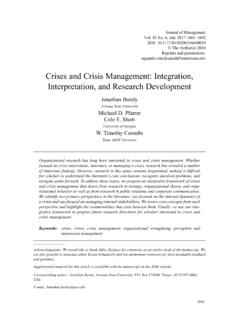Transcription of Policy Responses to the Economic Crisis: Investing in ...
1 Policy Responses to the Economic crisis : Investing in Innovation for Long-Term Growth June 2009. ORGANISATION FOR Economic CO-OPERATION AND DEVELOPMENT. The OECD is a unique forum where the governments of 30 democracies work together to address the Economic , social and environmental challenges of globalisation. The OECD is also at the forefront of efforts to understand and to help governments respond to new developments and concerns, such as corporate governance, the information economy and the challenges of an ageing population. The Organisation provides a setting where governments can compare Policy experiences, seek answers to common problems, identify good practice and work to co-ordinate domestic and international policies. The OECD member countries are: Australia, Austria, Belgium, Canada, the Czech Republic, Denmark, Finland, France, Germany, Greece, Hungary, Iceland, Ireland, Italy, Japan, Korea, Luxembourg, Mexico, the Netherlands, New Zealand, Norway, Poland, Portugal, the Slovak Republic, Spain, Sweden, Switzerland, Turkey, the United Kingdom and the United States.
2 The Commission of the European Communities takes part in the work of the OECD. OECD 2009. No translation of this document may be made without written permission. Applications should be sent to Policy Responses TO THE Economic crisis : Investing IN INNOVATION FOR LONG-TERM GROWTH 3. Foreword The current crisis is the first of this severity to hit OECD countries, since they have shifted to knowledge-based service economies where investment in intangible assets is of equal importance as investment in machinery, equipment and buildings. Efforts to stimulate the economy need to both reflect the current drivers of Economic growth and take advantage of the process of creative destruction to accelerate structural shifts towards a stronger and more sustainable Economic future. Innovation policies need to be adapted to current conditions both in terms of how such policies are crafted to work, but also as elements of stimulus packages that may often be the foundation for these medium- and long-term initiatives The OECD is developing a strategic response to the crisis focusing on two priority areas: finance, competition and governance; and restoring long-term growth.
3 As part of this strategic response, the OECD Directorate for Science, Technology and Industry (DSTI) has analysed the likely impact of the downturn on the drivers of long term Economic growth and the innovation-related items in Policy Responses of major countries. Special workshops and sessions on the Economic crisis were held by the Committee for Innovation, Industry and Entrepreneurship, the Committee for Scientific and Technological Policy , and the Committee for Information, Computer and Communications Policy . In January 2009, the OECD Directorate for Science, Technology and Industry circulated a questionnaire to member countries to collect information on specific innovation-related items of their stimulus packages. By May 2009, 27 member countries, all five OECD accession countries (Chile, Estonia, Israel, Russia and Slovenia) and South Africa had answered the questionnaire.
4 In May 2009, the three OECD Committees recommended to make public, under their responsibility, this updated version. This report presents the results of this exercise: the first chapter reports the general analysis of the impact of the crisis and the appropriate Policy Responses , and the second chapter reviews current national Responses . This report was prepared by Dominique Guellec and Sacha Wunsch-Vincent of the OECD. Secretariat. It has benefitted from inputs, co-ordination and oversight by Jean Guinet, Dirk Pilat, Graham Vickery and Andrew Wyckoff (OECD). The OECD Secretariat would like to express its appreciation to all OECD countries for responding to the questionnaire and working on all phases of this report. OECD 2009. 4 Policy Responses TO THE Economic crisis : Investing IN INNOVATION FOR LONG-TERM GROWTH. Table of Contents Part 1. FOSTERING INNOVATION FOR SUSTAINABLE GROWTH IN A TIME OF Economic crisis .
5 5. Part 2. ASSESSING Policy Responses TO THE Economic crisis FROM AN INNOVATION AND. LONG-TERM GROWTH PERSPECTIVE .. 17. OECD 2009. Policy Responses TO THE Economic crisis : Investing IN INNOVATION FOR LONG-TERM GROWTH 5. Part 1. FOSTERING INNOVATION FOR SUSTAINABLE GROWTH. IN A TIME OF Economic crisis . Innovation will be one of the keys to emerging from the current crisis , but it risks being hit hard by the downturn The Economic crisis has prompted an immediate response by governments to avoid a collapse of the financial and banking systems and limit the Economic effects of the credit crunch. Such policies aim at stabilising the economy and initiating a rapid recovery. But policies also need to ensure that the recovery is durable, based on sustainable growth. The crisis should not damage the drivers of long-term growth, but should instead be used as a springboard to accelerate structural shifts towards a stronger, fairer and cleaner Economic future.
6 Failing to do so might lead only to a temporary recovery as the macro- Economic and structural roots of the current downturn would remain untouched. This implies integrating long term concerns in the short term Policy packages currently assembled by governments and implementing specific policies aimed at strengthening the supply-side of the economy. While the impact of some of the latter actions may emerge in the medium- to long-term, they warrant consideration now because: They add credibility to government's borrowing demands that are imposing long-term debt, thus making a contribution to fiscal sustainability;. They take advantage of structural changes imposed by the crisis to accelerate a redeploy- ment of resources from ailing activities to those that offer the largest longer term Economic and social benefits. The foundation for these medium- and long-term initiatives consists of: fostering innovation through promoting entrepreneurship, Investing in smart infrastructure, encouraging R&D, green investment, upgrading the skills of workers, steering market actors towards innovation-related investments, and accelerating activities for which barriers may have been too high otherwise.
7 The crisis is affecting innovation and a number of other determinants of long-term growth Investments in innovation are declining in many firms The available evidence suggests that the crisis has already begun to affect innovation. Historically, business R&D expenditure and patent filings have moved in parallel with GDP, slowing markedly during the Economic downturns of the early 1990s and of the early 2000s (Figure 1). Data on trademark filings, that reflect the creation of new goods or services, with or without technological content, shows that the business cycle is affecting a wide range of innovation. OECD 2009. 6 Policy Responses TO THE Economic crisis : Investing IN INNOVATION FOR LONG-TERM GROWTH. Figure 1. The impact of the business cycle on innovation Business-funded R&D, patents (applications to the European Patent Office), trademarks (filed at the US Patent and Trademark Office) and GDP.
8 (Annual growth rate for the total of OECD countries; divided by standard deviation). 5. 4 GDP. 3. 2. 1. 0. EPO patents Industry R&D. -1. US Trademarks -2. 82 84 86 88 90 92 94 96 98 00 02 04 06. 19 19 19 19 19 19 19 19 19 20 20 20 20. Source: OECD, MSTI and Patent database. Evidence for the current crisis confirms these findings. Corporate reports for the fourth quarter of 2008 in many cases already show a decline or slower growth in R&D spending. Forecasts for 2009. confirm the trend. A recent McKinsey survey of almost 500 large businesses world-wide indicated that 34% expect to spend less on a R&D in 2009 while 21% forecast an increase. R&D is declining because it is mainly financed from cash flow (retained earnings), which contracts in downturns. At the same time, as banks, markets and investors have become more risk averse;. firms face difficulties in tapping into external sources of funding to support their investments in R&D.
9 Business R&D is also being re-oriented towards short-term, low-risk innovations, while longer term, high risk innovation projects are being cut first. The decline in business R&D risks affecting the stock of knowledge as highly trained researchers and innovators lose their jobs. Small, innovative firms are particularly hard hit because in many cases their primary asset is intangible in nature ( an idea or a patent) and difficult to value, making it hard to borrow against, or sell, to stay afloat. The crisis can, however, magnify the competitive advantage of research-intense firms who seize the opportunity to reinforce market leadership through increased spending on innovation and R&D. Many of today's leading firms such as Microsoft or Nokia were born or transformed in the creative destruction of Economic downturns. And several of today's leading technology firms such as Samsung Electronics, or Google strongly increased their R&D expenditures during and after the new economy bust of 2001.
10 OECD 2009. Policy Responses TO THE Economic crisis : Investing IN INNOVATION FOR LONG-TERM GROWTH 7. Figure 2. Investment in venture capital has fallen sharply (Venture capital investment in the United States, index: 2005 Q1 = 1). Source: PricewaterhouseCoopers and National Venture Capital Association. Fading support by the financial system for firms, and especially new entrants, is a major concern in the current context, underscoring the primary importance of fixing the financial system. Growing aversion to risk combined with other factors (such as difficulties for investors to exit) is already drying up many sources of seed and venture capital. The total amount of venture capital investment in the United States started declining at the beginning of 2008, and the fall accelerated at the end of 2008 and beginning of 2009 (Figure 2). Total investment in the 1st quarter of 2009 was down 60% as compared with the 1st quarter of 2008, while 1st sequence investment was down 65%.















